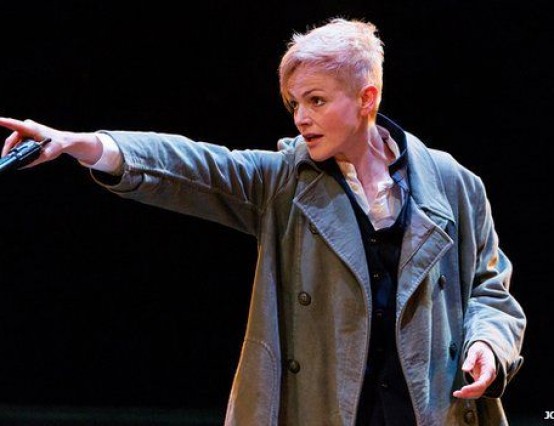Capturing the spectacle and hidden complexities to the lives of the Royal family has always been an onerous task, and Mike Bartlett’s modern recreation of Shakespeare’s historical plays is perhaps one of the strongest canvases for exploring this fundamental part of Britain. In Brighton Little Theatre’s latest adaptation of Bartlett’s play for Brighton fringe, we are left still wondering as to the true natures and motivations of the characters we have just watched battle for power for two hours.
The lyricism of Bartlett’s uniquely blank verse script is frequently ignored by the actors, with the pace of the text in particular being left on the side-lines by most within this performance. A number of performances are unfortunately wooden, with most secondary actors preferring to exert cheap laughs through exaggerated delivery rather than pursuing the complexity of each royal family members desires and motivations. Our eponymous lead (played by John Tolputt) gives a strong performance despite a weak delivery of Charles’ opening monologue, which failed to capture the ambitious solemnity of his constitutional inheritance. Thankfully, he manages to reclaim his performance as he becomes a man pushed to the outskirts of power by his own family, and he successfully evokes our outrage at his personal injustice.
It is certainly a very hit and miss production, a number of scenes have a tendency to fall flat and characterisation is lost in clichés. However, a number of directorial success’ keep its head floating above the water. The company is particularly successful in capturing both the reverent and sorrowful tone of Elizabeth II’s funeral at the opening of the play, as well as the fury and charged anarchy of the anti-monarchist riots in the second Act. The company’s ensemble works cohesively to create these contextualising scenes, utilising clever physicality to capture the essence of the changing moods the play presents.
There choice to present the ghost of Diana as a non-physical being, using instead a recorded overhead audio to embody her presence upon appearing to both Charles and William, allows the production to play to its own strengths. Rather than lose the desired effect due to limited sound and lighting capabilities, this allows Diana’s brief, vocal appearance to be hugely effective, adding a sinister quality to the characters motivations. The director seemingly draws a comparison to Macbeth’s absent dagger in this ghostly scene, providing the performance with a greater depth that it would otherwise lack.
Despite the limited space of the company’s chose theatre they still manage to have a strong use of their surroundings. For ceremonial scenes such as the funeral and coronation, in which the necessity for spectacle is ever present, the actors descend down the aisles, providing a more immersive quality to the production. Michael Folkard’s set design proving to be the key in allowing the production to maintain its smooth versatility. A simple neutral backdrop with cracks revealing images from the press lends itself well to the myriad of stories being told, and convincingly serves as the Royal apartments, a club and Westminster Abbey.
Whilst this production does have its moments of poetry, a number of flat performances leaves it to have some disappointing moments. It is certainly worth a watch for its interesting story and some elegant direction, however its success’ are too few and far between for this show to be the hit it has the potential to be.









0 Comments